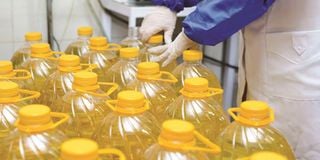Premium
Queries arise about how trading agency issued Sh21bn duty-free importation tender

KNTC contracted Multi Commerce FZC for Sh8.12 billion to supply vegetable oil and Indian white rice.
At least seven companies have been contracted by the Kenya National Trading Corporation (KNTC) to import various duty-free commodities, including rice, edible oils and fertiliser, that will cost the taxpayer Sh21.76 billion.
The supplies are meant to cushion at least 1.5 million Kenyans from starvation caused by the ravaging drought and also help subsidise food production.
However, questions have been raised about how KNTC contracted the seven firms. Fears abound in Parliament that there was no competitive bidding as provided for under the Public Procurement and Asset Disposal Act and that the contracts were simply dished out to favoured entities.
A document filed in the National Assembly, a copy of which is in our possession, shows that KNTC has contracted Multi Commerce FZC for Sh8.12 billion to supply vegetable oil and Indian white rice. Standard Petroleum won a Sh5.5 billion deal to supply rice, red kidney pinto beans, cooking fat and fertiliser.
Also Read: Cheap food lie - The making of a scandal
Lamar Commodity Trading will pocket Sh2.7 billion to supply NPK fertiliser (quantity is not stated), while Charma Holdings Limited has a Sh2 billion tender to supply edible vegetable oil. The others are Makram Imports and Export Limited with a Sh1.88 billion tender for the supply of Indian raw white rice, Shehena Company Limited to supply jerry cans of edible oil at Sh1.33 billion and Nutrivine Sh187.5 million to supply rice.
KNTC Managing Director Pamela Mutua confirmed that some supplies have already started trickling in for onward selling to consumers but remained mum on how the companies involved were identified.
“For all commodities, we are progressively issuing contracts and we have started receiving the commodities for sale to consumers,” said Ms Mutua. Pressed on the procurement process, she said: “All procurement laws as stipulated were followed. We are a public body guided by the procurement law.”
It is not clear why KNTC was given the billions of shillings to oversee the importation of the commodities given that its latest audited financial statements show that its total annual income was Sh150 million with a profit of Sh15 million.
Vihiga Senator Godfrey Osotsi said that the dealings at the KNTC have all the “ingredients” of the National Youth Service (NYS) and the Kenya Medical Supplies Authority scandals and there is every reason to have a special audit.
“It is no surprise that such questionable procurements have started to emerge. Even though Kenya Kwanza has never showcased its commitment to the war against corruption, the KNTC management should come out clean and explain how the contracts were awarded,” said Mr Osotsi.
When the Jubilee administration came to power in 2013, NYS allocation was barely Sh1 billion in a financial year. However, the allocation shot up to Sh25 billion in the 2015/16 financial year. It was in 2015 that the first NYS scandal was first reported.
The document shows that Lamar Commodity Trading has imported 150,000 metric tonnes each of NPK 23.23.0 and NPK 17.17.17 under the brand name of KNTC. What the MPs will be investigating is why the importation was under KNTC’s brand name and whether it facilitated the bank loans.
KNTC also contracted two firms under the brand names of Yara and ETG to supply 112,700 tonnes and 130,000 tonnes of fertiliser, respectively. The arrangement, according to the document, was that KNTC takes, sells and pays the consignees, but Mr Osotsi noted that KNTC is not pushing for the uptake of its own brand name fertiliser “yet it has loans and accrued interests to pay”. “This poses a risk on the commitment to service the loans efficiently and effectively,” Mr Osotsi said.





